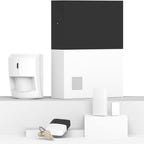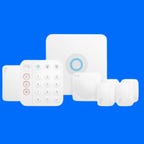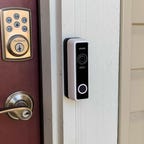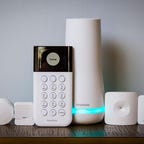Best Home Security Systems of 2024
We've tested the latest home security systems -- in our own homes. Now we've picked the best options for professional installs, DIYers, smart home geeks and lots more.
What to consider
Equipment and installation
Monitoring and alerts
Ongoing Costs
Our Picks

What is the best overall home security system?
How do you pick the top home security systems? We chose several different routes at once: In over 200 hours and many years of testing the latest home security kits, our experts identified systems that worked best for professional installation, DIY taskmasters and those who already have a bunch of smart gadgets to integrate. If you prefer a professional system, Comcast Xfinity Home is your top option. If you want a security kit you can easily build out over the course of a couple of years, Vivint is your best choice.
We also have an excellent DIY option with Ring Alarm -- no contract necessary and sporting a relatively affordable subscription plan, plus more picks for a variety of users. Whether you're looking for a system that works with your new video doorbell, or want a complete package outfitted with sensors for every window, take a look at our picks. Scroll even further down to learn how we picked, what features you should always keep an eye on and what brands didn't make the cut.
If you're curious about expanding your security system in the future or investigating alternatives, find our recommendations for popular smart home security gadgets like indoor and outdoor cameras, video doorbells and smart locks. If you're adding these gadgets, you should also check on the spots no one should ever use them.
Best home security systems of 2024
Comcast Xfinity Home is a terrific, accessible and affordable service, which is why we gave it an 8 out of 10 in our review. It could cost you thousands less than comparable setups from direct competitors like Vivint and ADT, works with plenty of third-party smart home gadgets and doesn't require a contract.
Xfinity's base home system currently starts at $360, including a touchscreen hub, three access point sensors for doors and windows and a motion sensor for key points inside a home. You can also add other devices like an Xfinity camera, thermostat or smoke detector -- but we suggest making use of the strong third-party support instead. Xfinity's system can work with August, Yale, Lifx, Ecobee, Philips Hue and other smart home brands, so you have plenty of options. Subscription packages are divided into self-monitoring and professional monitoring tiers, with the $10 per month self-monitoring giving you Wi-Fi, third-party support and app control. That makes it a requirement to use this system, so we suggest planning for at least the lower tier.
If you can get around Comcast's pressure to bundle with their other services and the service's limited home automation capabilities, this home security system will treat you well.
Best DIY home security system
Ring Alarm 8-Piece Kit (2nd-gen)
Ring offers some excellent home security packages for users who want to take everything into their own hands, from picking out add-ons to choosing just the right spot on the wall. This eight-piece starter kit provides four important sensors, a base station plus a keypad, a motion detector and a range extender for those worried about Wi-Fi. We also like the Pro version of this package, but the second-gen kit is a bit newer and doesn’t force you to use the built-in router (we prefer picking out our own routers).
Amazon’s Ring devices include excellent Alexa support, and DIYers will like the largely intuitive management app (if you’ve set up any smart devices before, these app controls will come easily to you). In addition to direct controls and sensor notifications, users can also switch between home and away modes on the fly. If you decide to expand, almost any Ring product will be compatible including their security cameras and video doorbells, so it’s easy to level up.
Two final important notes about choosing Ring: First, in 2024, Ring officially changed its policy on allowing police to directly request user video footage. Now they listen to such requests only in case of a life-or-death emergency, similar to Google and other brands but a noted improvement from their previous stance.
Second, while Ring is very DIY-friendly, professional monitoring does require the brand's top-tier subscription for $20 per month. That’s lower than some of our other picks but still pricier than a cloud storage plan would be.
Best home security system for smart home integration
Abode Wireless Smart Security Kit
Thanks to Abode’s frequent deals, you can find home starter kits for as low as $100, one of the cheapest options on the market. We suggest going up a step and picking the still-affordable $160 smart security kit, which adds a motion sensor to the package and expands smart home compatibility to Apple Home/Siri as well as Alexa and Google Assistant. We know it’s not easy to find a home security system that works with the Apple Home app, especially at a low price, so Apple fans may be especially pleased.
The tidy package is easy to manage once you’ve found a place for Abode’s block hub, and DIYers will appreciate the no-tools installation design (which also makes this a great pick for renters). Even with its big discounts, Abode’s system still has important features like battery backups. Abode also has deeply impressive third-party compatibility, supporting integrations with Nest, Yale, Philips Hue, Amazon Echos, Ecobee and more. If you already have smart devices, there’s a good chance they’ll be supported; check out the full list here.
If you’re looking for professional monitoring, Abode does offer it with its Pro plan, which also includes cellular backup. It will cost $25 per month, which isn’t exactly friendly for the budget conscious but saves you significant money compared to the most expensive plan.
Best build-as-you-go home security system
Vivint Smart Home
Vivint gives you a super-polished experience with third-party device integrations -- and it doesn't require a contract. The starter package includes only a touchscreen and a couple of sensors, but Vivint works well with voice assistants like Google Assistant and Alexa and supports a wide array of additional Vivint and third-party devices (see our full review for more).
That's great news if you'd like to add a compatible smart garage door, video doorbell or security camera system, but on your terms and timing. You can also adjust your budget based on what you'd like to buy now and purchase later. Vivint is the only brand with this approach, but it has one of the best offerings to begin with a starter kit and build from there.
With monthly monitoring ranging from $30 to $45 a month, it's comparable month to month with Xfinity and includes valuable extras like video storage too. Unfortunately, these are some of the highest subscription costs on our list. It's becoming less and less common for security brands to charge so much for professional monitoring (as you'll see below), but for these systems, if you want the pros to keep an eye on your home, you'll have to pay for it.
Best starter kit home security system
SimpliSafe
We've tested the SimpliSafe system several times and most recently gave it a review score of 8.5 out of 10. If you're looking for home security -- without all the extra Wi-Fi and smart home integrations of the Ring Alarm kit -- SimpliSafe's easy-to-install, easy-to-use DIY system is a great option. It offers a comprehensive set of features, including equipment like security cameras and a very good mix of battery-powered motion detection sensors, all of which performed reliably well in our tests.
Starter kits begin at less than $250, or you can build a custom alarm system with the exact mix of devices you need. The security company's professional monitoring plan starts at $18 a month, but you'll almost certainly want to spring for the $28-per-month monitoring service plan, which adds in things like mobile app controls and smart home security system voice support via Alexa and Google Assistant.
Note: SimpliSafe is currently offering 40% off its systems.
Home security systems compared
| Best home security systems: | Comcast Xfinity | Vivint Smart Home | SimpliSafe (8-piece set) | Ring Alarm Pro System (2nd-gen) | Abode Home Security System |
|---|---|---|---|---|---|
| System price | $360 | $500 | $240 | $250 | $239 |
| Monthly monitoring price | $30 | $30-$45 | $18-$28 | $20 | $25 |
| Starter equipment | Touchscreen controller, three door-window sensors, pet-friendly motion sensor, battery and cellular system backup, Xfinity Home Security yard sign | Hub, two door window sensors, a motion detector, a flood sensor | Base station, keypad, motion sensor, four entry sensors, one panic button | Eero Wi-Fi 6 mesh router, door-window sensors, motion detectors, a keypad, a siren and optional professional monitoring subscriptions | Smart security hub, mini door/window sense, motion sensor, key fob |
| Contract required? | No | No | No | No | No |
| Setup | Professional installation | Professional installation | DIY installation | DIY installation | DIY installation |
| Extra features | Integration with a large and growing list of third-party devices, flexible pricing | Customizable system, integration with many third-party devices, integration with Amazon Alexa, Google Home and Z-Wave devices | Customizable system, built-in Wi-Fi and cellular, integration with Amazon Alexa and Google Assistant | Cellular-powered backup Wi-Fi, network security monitoring, local processing, storage for all of your Ring devices and integration with Alexa's Guard Plus service | Customizable system, cellular backup, integration devices from Sonos, Nest and more, integration with Amazon Alexa, Google Assistant and Siri |
| Review score | 8 | 7.7 | 8.5 | 9 | 8.3 |
Factors to consider when choosing a home security system
When choosing a home security system for your home, you may be tempted to start by deciding between a DIY setup or one that is professionally installed and monitored. When you consider the equipment, installation, monitoring options and other features you want, you'll probably reach a DIY-versus-pro system decision along the way. Here are some more parameters to consider when shopping around for home security systems:
Equipment and installation
Do you just need to keep watch over your entryways? A good video doorbell for your front door and an outdoor camera covering the back may be all you need -- easy to install and monitor yourself. If you want to keep closer tabs on your home inside and out with 24/7 monitoring and quick access to emergency response services, you'll want a more robust system. DIY and professional brands offer home security bundles with most, if not all, of the equipment you'd need to get started and the ability to add single devices as needed.
SimpliSafe home security systems can be easily tailored to your needs. Just simply add or subtract hardware and equipment as you please.
Most home security devices are compatible with Alexa and Google Home smart hubs, but if you prefer Apple HomeKit or another smart home ecosystem, you may have to do a bit more shopping and comparing to find a system compatible with your existing smart home devices. Don't fret over compatibility too much as Matter will make it easier to connect previously noncompatible devices (although it hasn't quite come for security cameras yet).
Keep in mind all that equipment will need to be installed. While there isn't much to installing a security camera or even a wired video doorbell, whole-home systems can be a bit more demanding to install and set up. Some are DIY-friendly and use adhesive to position devices without leaving permanent marks, but not all systems do this. If you'd rather leave that to an expert and have them walk you through how to use the system, a professional home security service may be the way to go.
Monitoring, alerts and emergency features
Arlo's app is simple and intuitive to use.
Virtually all home security systems allow for self-monitoring, likely via an app on your phone. They'll also send you push notifications when there's an event, such as when a package is delivered to your doorstep.
Consider whether you want to be in charge of all the monitoring or if you'd like some support. A professional system will come with 24/7 monitoring, but you may be able to add professional monitoring to your DIY system for a fee, depending on the brand you choose.
More advanced features, such as facial recognition, broken-glass detection and communication with emergency services may not be available from all manufacturers and devices. Consider the level of monitoring you want, and who you want to do it, along with the emergency response options, when choosing a home security system.
Costs, upfront and ongoing
We listed "cost" last here for a reason. A complete home security system will likely cost you at least a couple of hundred bucks, so be prepared for that. There's the potential to spend lots more on equipment, or a lot less; maybe a $35 security camera will satisfy your security needs. Also, keep in mind that the size of the system greatly affects the cost. Starter systems like many we listed here typically cost between $150 and $300, and allow you to add other compatible devices over time. Larger systems with 10 devices or more will cost at least several hundred dollars and can go up to $1,000 or more, depending on the tech that's included.
Ongoing costs can carry a bit more weight when choosing the best security system. Expect ongoing monthly fees from a professional service and possibly a contract to lock you into those fees for a year or two (although we favored picks without a required contract). While not ideal, signing a contract may come with free equipment or installation and lower upfront costs.
If you're comfortable with self-monitoring, DIY systems may not come with any ongoing costs. Monthly subscriptions (without a contract) for cloud storage, enhanced features and possibly even professional monitoring are typically an option with DIY systems, often for lower monthly fees than professional services.
How we test home security systems
Hands-on testing is core to our evaluations of any home security products. In short, when it comes to the best home security systems, we pay special attention to the user experience, the promised features, reliability and overall value, along with a few other elements. We do the testing in a real home environment over at least a full week. This includes testing sensors at common access points, seeing how systems arm and disarm, and finding out how voice controls and smart device integration work with the app. Along the way, we keep a careful eye on durability and design quality so we avoid recommending any shoddy products.
If you want to read more about our review process, check out our in-depth article on how we test home security systems and services.
The Ring Alarm Pro offers a slew of excellent features -- and we tested everyone of them.
Other home security systems we've tested
Besides the systems above, we've tested many of the top competitors, including Abode Iota, Frontpoint, Kangaroo, Cove and ADT. DIY systems Frontpoint, Cove and Kangaroo all had features to recommend them. Frontpoint's system is reliable, and its hardware is reasonably priced, but its $45 monthly monitoring fee is too expensive. Kangaroo, by contrast, is incredibly wallet-friendly, but its doorbell camera is terrible, so Wyze keeps its edge in the budget category too. Cove Home Security, despite reasonable hardware prices, fell to an overly restrictive subscription model that doesn't allow for self-monitoring or app access without significant monthly fees.
ADT, one of the biggest brands we've tested, was broadly disappointing. It's too expensive, requires a contract and the app is clunky. We've tested AT&T Digital Life too, although we've removed the system from consideration since the company stopped installing it for new customers.
As for Wyze, we appreciate its excellent budget home security offerings, but we're holding off on recommending it at this time. Wyze has been struggling with frequent security vulnerabilities in recent years, a problem it doesn't seem to have under control at this time. If we see signs that Wyze is making strides in privacy and security, we'll consider its newest systems for our list too.







